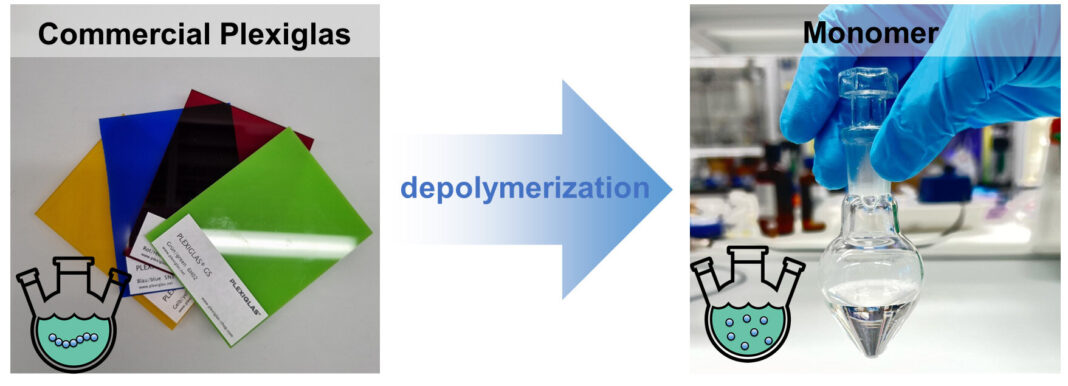A team of materials scientists and engineers at ETH Zurich has developed a light-triggered chemical process for breaking down certain polymers into their constituent monomers. The paper is published in the journal Science.
In recent years, scientists have become aware of new problems associated with the mass production of polymers—microplastics can now be found on every part of the Earth, including inside virtually every person on the planet. Part of the problem is the difficulty and expense involved in recycling plastics, which makes it easier to throw them in the trash or the ocean.
In this new study, the researchers in Switzerland have developed a way to break down plastics into their monomer constituents, allowing for much easier and cheaper recycling.
Plastics are polymers, substances made up of large molecules called macromolecules, which consist of smaller subunits called monomers. They are formed using a process called polymerization, which in essence combines the monomers into a single substance, namely plastic. Pulling them apart again has proven to be difficult and expensive, until now.
The new process involves placing the polymer in a dichlorobenzene solvent and then shining a violet light on it as reactions in the solvent take place—no reagents or other catalysts are needed. The only other caveats are that conditions in the vat must be kept above 90°C, and the light must remain on the whole time. Once finished, the result is a vat filled with monomers and other chemicals, which can be easily separated and recycled.
The technique was discovered by accident, so the team sought to explain why it worked so well. They found that dichlorobenzene, when exposed to the polymer, produced chlorine radicals under the light. The radicals then pulled hydrogen atoms from seemingly random parts of the polymer backbone, causing it to break. Even better, when it broke, a new radical was formed, kicking off more reactions.
The researchers acknowledge that the reaction is slow, but also note that it has a high yield and that it is simple, easy and inexpensive to conduct. They suggest it could transform the recycling of plastics around the world.
More information:
Hyun Suk Wang et al, Visible light–triggered depolymerization of commercial polymethacrylates, Science (2025). DOI: 10.1126/science.adr1637
© 2025 Science X Network
Citation:
Light-triggered process breaks down polymers into monomers for easier recycling (2025, February 22)
retrieved 22 February 2025
from https://phys.org/news/2025-02-triggered-polymers-monomers-easier-recycling.html
This document is subject to copyright. Apart from any fair dealing for the purpose of private study or research, no
part may be reproduced without the written permission. The content is provided for information purposes only.





